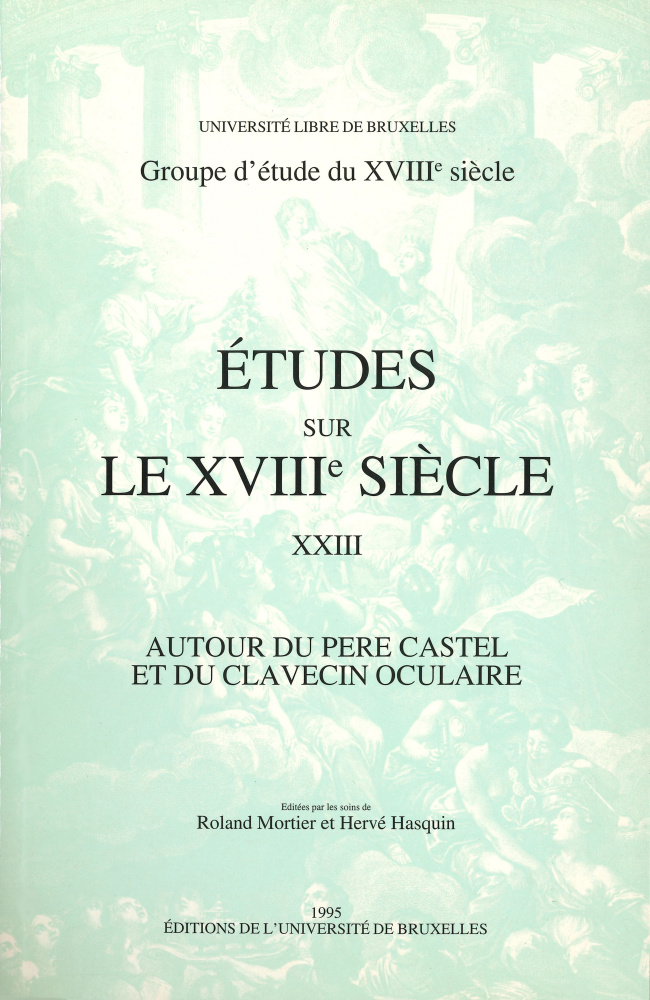Autour du père Castel et du clavecin oculaire
First Edition
Au fil des contributions réunies dans cette publication se dessine le portrait du père Castel et de son ingénieuse invention, le clavecin oculaire.
Specifications
- Publisher
- Éditions de l'Université de Bruxelles
- Edited by
- Roland Mortier, Hervé Hasquin,
- Foreword by
- Manuel Couvreur, Jean-Louis Jam,
- Contributions by
- Anne-Marie Chouillet, Karine Van Hercke, Daniel Bariaux, Corinna Gepner, Michel Blay, Jean-Louis Jam, Jean Ehrard, Lucette Pérol, Alain Montandon, Manuel Couvreur, Philippe Vendrix, Nadine Vanwelkenhuyzen,
- Journal
- Studies on the XVIIIth Century | n° 9
- ISSN
- 07721358
- Language
- French
- Supporting Website
- Digithèque de l'ULB
- Publisher Category
- Publishers own classification > Art(s) & Archeology
- Publisher Category
- Publishers own classification > History
- BISAC Subject Heading
- HIS037050 HISTORY / Modern / 18th Century
- Onix Audience Codes
- 06 Professional and scholarly
- CLIL (Version 2013-2019)
- 3388 Les temps Modernes (<1799)
- Subject Scheme Identifier Code
- Thema subject category: European history
Paperback
- Publication Date
- 13 December 1995
- ISBN-13
- 978-2-8004-1127-9
- Extent
- Main content page count : 224
- Code
- 1127
- Dimensions
- 155 x 240 x 18 cm
- Weight
- 279 grams
- ONIX XML
- Version 2.1, Version 3
Google Book Preview
Contents
Avant-propos | Manuel COUVREUR et Jean-Louis JAM
Le père Castel et son clavecin oculaire | Anne-Marie CHOUILLET
Le journal du clavecin oculaire : démonstration philosophique, esthétique, apologétique ou poétique ? | Karine VAN HERCKE
Le clavecin oculaire du père Castel : outil d'exploration du geste artistique | Daniel BARIAUX
Le regard en mouvement | Corinna GEPNER
Castel critique de la théorie newtonienne des couleurs | Michel BLAY
Castel et Rameau | Jean-Louis JAM
Une « amitié de trente ans » : Castel et Montesquieu | Jean EHRARD
Diderot, le P. Castel et le clavecin oculaire | Lucette PEROL
Castel en Allemagne : Synesthésies et correspondances dans le romantisme allemand | Alain MONTANDON
Aperçus d'un naufrage : les ouvrages perdus ou inédits du père Castel | Manuel COUVREUR
Castel et la musique: quelques aspects inédits | Philippe VENDRIX
Du Jardin des délices au désert des Tartares : variations du père Castel sur l'origine des langues | Nadine VANWELKENHUYZEN
Annexes
Annexe I : Textes inédits
Plan d'impression
La clef de l'histoire et des arts
Traité sur l'imagination
Lettre à la comtesse de Maillebois
Annexe II : Liste des manuscrits du père Castel conservés à la Bibliothèque royale Albert Ier de Bruxelles | Manuel COUVREUR et Philippe VENDRIX
Annexe III : Liste chronologique des écrits publiés par le père Castel | Manuel COUVREUR

